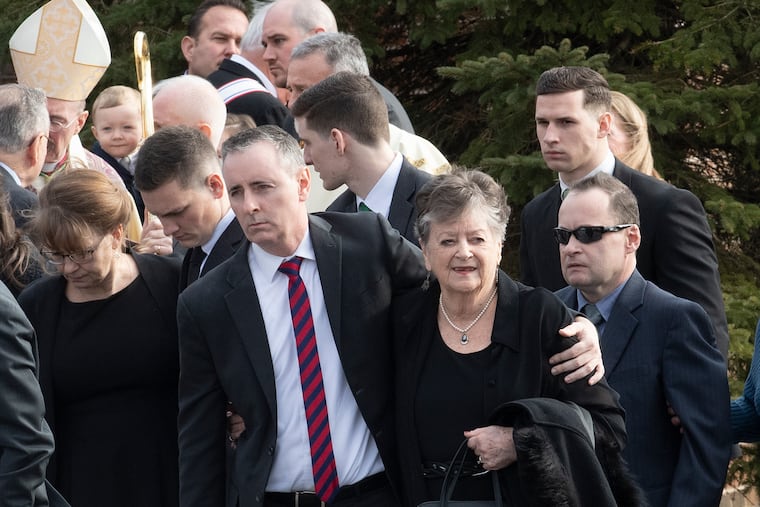At funeral for former U.S. Rep. Mike Fitzpatrick, a chilling portrait of our failure against cancer | Maria Panaritis
His mom, dad, grandparents and a sister all had cancer. How is this possible in America in 2020?

The casket spray of red, white, and lavender flowers had just been taken down when Bucks County Rep. Brian Fitzpatrick — walking alone but in front of hundreds of people gathered inside a Levittown church — stepped toward the casket and looked down, with an anguished face, at the man inside. The casket was about to be shut. He leaned into his big brother for what felt like forever. Then, as everyone eventually must do during a funeral, he walked away.
No longer was this the chubby-cheeked pipsqueak version of Brian — the one in a faded Fitzpatrick family photograph on a memorial montage nearby. In that classic photo, Mike, the oldest of eight, is right behind Brian, in braces and a wide-lapeled getup betraying the sartorial tragedies of a 1970s childhood. No — Brian was now a congressman and Mike, dead at 56 and inside that casket, the former congressman who’d previously held Brian’s seat.
There were, according to one congressman I spoke to, a total of five current or former members of the U.S. House of Representatives at the funeral. But what truly had brought out the hundreds, if not thousands, of people over two days could be named in a single word.
Cancer.
It is the one word that none of the 13 priests and bishops I counted on the altar uttered during a Mass that hewed closely to a standard Catholic service, with eulogies reserved for a luncheon later in the afternoon.
It is the one word that, along with the word congressman, had brought me to Queen of the Universe church for the viewing and funeral.
It is the one word that, despite a stirring and deeply personal homily, Father Thomas More Garrett had studiously avoided saying at all. Perhaps, I wondered, the priest had done so to keep cancer’s harrowing echo as far from these wounded hearts as possible. Father Garrett called Mike a mentor; they had worked together in Washington before Garrett became a priest. He spoke of how, a few days ago, the former congressman had asked that he be by his side.
“It must have been hard to lose the capacity to speak easily” is all Father Garrett said. Mike died Monday.
In the front row sat the late congressman’s wife and six children. Behind them was Brian and the elderly parents, Mary and James Fitzpatrick, who had now outlived their oldest son.
We fancy ourselves the world’s leading economy and democracy, but we have proven so feeble at defeating one of our cruelest medical foes.
We are living, in 2020, at a time of incredible wealth and innovation. U.S. fortunes are being spent to develop driverless cars; billionaires and politicians are lustily eyeing outer space as the next frontier even as cancer remains a terrorist on our soil. Space-age wireless earbuds connect our brains to sophisticated pocket computers that we recklessly fiddle with for hours. But cancer is just too tough? Really?
We should take little comfort in the news this week — a drop in cancer mortality rates. While good news, it represents only modest progress.
There are gleaming, new hospital towers devoted to cancer treatment — some very sparkly and expensive ones in our very own Philadelphia. There are people in the medical world who refer to cancer as “growth divisions” within their institutions. As though this pestilence were merely a revenue opportunity around which to build a management bonus objective.
All the while, people we love — moms and friends and janitors — are being diagnosed or dying.
Even a powerful guy like Mike Fitzpatrick.
A man who — on top of that — had lived with the knowledge that cancer had taken disproportionate aim at members of his immediate family.
“In my case,” the then-still-congressman wrote in 2013, “four grandparents died from cancer; both my parents are cancer survivors, and a sister.”
Mike had written that in an essay still online for the American Association for Cancer Research in Philadelphia. AACR told me they annually ask Republicans such as Fitzpatrick and Democrats to share their cancer experiences to fuel advocacy for research money.
“Thus far, I’ve been spared and I’m forever thankful to God and the wonderful care I received, and continue to receive, in follow-up visits,” Fitzpatrick wrote. “I have the utmost respect for those in the healing profession — the physicians and scientists who have chosen this path so others may live. They have my heartfelt gratitude.”
Among the mourners Friday was GOP political strategist Athan Koutsiouroumbas. His name was all over a photo montage that celebrated Mike’s grit and, in one cheeky section, talked about how Mike had spent one 15-hour day in the congressional district hitting all eight Burger Kings.
He remembered how Mike was diagnosed with stage 3 colon cancer in 2008, after losing his seat to Democrat Patrick Murphy in 2006. Treatments went well. Cancer-free by 2010, he won back his seat. Months later, and after what he thought was benign foot pain, came melanoma.
“It’s devastating,” Koutsiouroumbas said.
Pat Wandling, now 85, used to babysit Mike before she became a journalist, and over the last two decades, worked for him as a writer. She remembered him going for chemo and coming to work without saying a word.
But one thing also stands out: the memory of a man as a playful tyke.
“I can picture him, to this day, 2 years old,” she said. “He would hide before he’d go to sleep.”